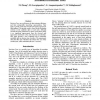Free Online Productivity Tools
i2Speak
i2Symbol
i2OCR
iTex2Img
iWeb2Print
iWeb2Shot
i2Type
iPdf2Split
iPdf2Merge
i2Bopomofo
i2Arabic
i2Style
i2Image
i2PDF
iLatex2Rtf
Sci2ools
111
click to vote
FLAIRS
2006
2006
Generalized Entropy for Splitting on Numerical Attributes in Decision Trees
Decision Trees are well known for their training efficiency and their interpretable knowledge representation. They apply a greedy search and a divide-and-conquer approach to learn patterns. The greedy search is based on the evaluation criterion on the candidate splits at each node. Although research has been performed on various such criteria, there is no significant improvement from the classical split approaches introduced in the early decision tree literature. This paper presents a new evaluation rule to determine candidate splits in decision tree classifiers. The experiments show that this new evaluation rule reduces the size of the resulting tree, while maintaining the tree's accuracy.
Related Content
| Added | 31 Oct 2010 |
| Updated | 31 Oct 2010 |
| Type | Conference |
| Year | 2006 |
| Where | FLAIRS |
| Authors | Mingyu Zhong, Michael Georgiopoulos, Georgios C. Anagnostopoulos, Mansooreh Mollaghasemi |
Comments (0)

